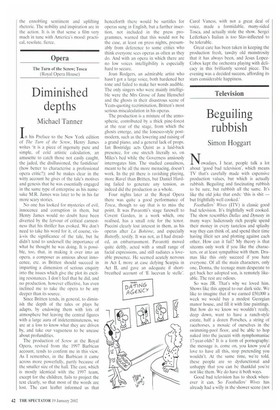The Turn of the Screw; Tosca (Royal Opera House)
Diminished depths
Michael Tanner
In his Preface to the New York edition of The Turn of the Screw, Henry James writes 'it is a piece of ingenuity pure and simple, of cold artistic calculation, an amusette to catch those not easily caught, the jaded, the disillusioned, the fastidious' (how better to characterise a professional opera critic?); and he makes clear in the witty account he gives of the tale's motives and genesis that he was essentially engaged in the same type of enterprise as his namesake M.R. James was later to be in his far more scary stories.
No one has looked for mysteries of evil, innocence and corruption in them, but Henry James would no doubt have been diverted by the fervour of critical earnestness that his thriller has evoked. We don't need to take his word for it, of course, visa-vis the significance of the tale, but he didn't tend to undersell the importance of what he thought he was doing. It is possible, too, that, in making it over into an opera, a composer as anxious about innocence, etc. as Britten should succeed in imparting a dimension of serious enquiry into the issues which give the plot its exciting resonances. I don't feel that he did, and no production, however effective, has even inclined me to take the opera to be any deeper than its source.
Since Britten tends, in general, to diminish the depth of the tales or plays he adapts, by endowing them with lots of atmosphere but leaving the central figures with a large aura of indeterminateness, we are at a loss to know what they are driven by, and take our vagueness to be unease about profundities.
The production of Screw at the Royal Opera, revived from the 1997 Barbican account, tends to confirm me in this view. As I remember, in the Barbican it came across more powerfully, partly because of the smaller size of the hall. The cast, which is mostly identical with the 1997 team, except for the children, fails to project the text clearly, so that most of the words are lost. The cast leaflet informed us that henceforth there would be surtitles for operas sung in English, but a further insertion, not included in the press programmes, warned that this would not be the case, at least on press nights, presumably from deference to some critics who think everyone sees operas as often as they do. And with an opera in which there are no low voices intelligibility is especially hard to secure.
Joan Rodgers, an admirable artist who hasn't got a large voice, both hardened her tone and failed to make her words audible. The only singers who were mainly intelligible were the Mrs Grose of Jane Henschel and the ghosts in their disastrous scene of Yeats-quoting recrimination, Britten's most serious miscalculation in his operas.
The production is a mixture of the atmospheric, contributed by a thick pine-forest at the rear of the stage, from which the ghosts emerge, and the Ionesco-style postmodern, such as the lowering and raising of a grand piano, and a general lack of props. Ian Bostridge acts Quint as a laid-back presence, for one stretch literally so, on Miles's bed while the Governess anxiously interrogates him. The studied casualness, meant to be all the more menacing, doesn't work. In the pit there is ravishing playing, more Ravel than Britten, but Daniel Harding failed to generate any tension, as indeed did the production as a whole.
Four nights later at the Royal Opera there was quite a good performance of Tosca, though to say that is to miss the point. It was Pavarotti's stage farewell to Covent Garden, in a work which, one realised, has a small role for the tenor. Puccini clearly lost interest in them, as his operas after La Boheme, and especially Ballo*, testify. It was not, as I had dreaded, an embarrassment. Pavarotti moved quite deftly, acted with a small range of facial expressions, and still radiates a loveable presence. He seemed acutely nervous in Act I, more at ease defying Scarpia in Act II, and gave an adequate if shortbreathed account of 'E lucevan le sidle'. Carol Vaness, with not a great deal of voice, made a formidable, many-sided Tosca, and actually stole the show. Sergei Leiferkus's Italian is too Slav-inflected to be tolerable.
Great care has been taken in keeping the production fresh, tawdry old monstrosity that it has always been, and Jesus LopezCobos kept the orchestra playing with delicacy in this brilliantly scored piece. The evening was a decided success, affording its stars considerable happiness.






























































 Previous page
Previous page